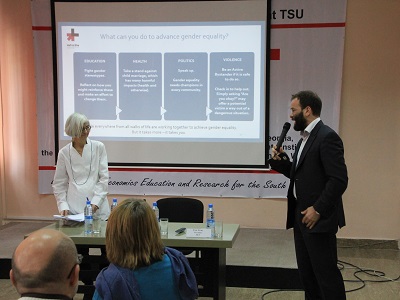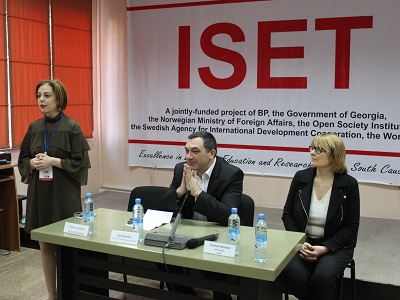On April 10, ISET students delivered yet another policy seminar. A presentation entitled “Foreign Direct Investment (FDI) & Economic Growth. Case of Georgia” was delivered by Givi Gujaraidze, Tinatin Mumladze, Kristine Gureshidze, and Shota Bakhuashvili under the supervision of Eric Livny, President of ISET, and Yaroslava Babych, Head of Macroeconomic Policy Research Center at ISET Policy Institute. The presentation was mostly oriented towards the case of Georgia. It aimed to highlight the importance of FDI for the Georgian economy and show the impact of FDI on growth rates of different sectors of the economy. The presentation provided information about the country’s investment environment: why is Georgia an attractive country for foreign investors and why is it easy to do business in Georgia. Additionally, the last part of the presentation discussed examples of successful FDI projects in different areas.
On April 6, ISET hosted a seminary by World Bank Senior Director on Gender Ms. Caren Grown, on Gender Equality as a Smart Development Policy in Georgia. Ms. Caren Grown was invited as part of the anti-corruption course jointly organized by ISET and the NHH (the Norwegian School of Economics).
Ms. Grown discussed the relationship between economic development and gender equality in global and Georgian contexts, and the remaining gaps in both. Gender equality was reviewed in three dimensions: human endowments (health and education), economic opportunities, and voice and agency. The main motto of the seminar was, as Ms. Grown mentioned several times, “difference does not mean that we are unequal”. While presenting, Ms. Grown often referred to Norwegian examples and comparisons in order to give a better idea to students how two countries such as Georgia and Norway stand in gender equality.
Giga Bokeria, the leader of the European Georgia opposition party, visited ISET to deliver a lecture on anti-corruption reforms in Georgia carried out by the United National Movement government of 2003-2012. Bokeria, a UNM member until 2017, played an integral role in the Rose Revolution, which ousted the late Eduard Shevardnadze, under whose tenure Georgia had become wracked by institutional corruption.
Bokeria was invited to speak to visiting Norwegian students who partook in a four-day visit to Tbilisi to attend an anti-corruption course jointly organized by ISET and NHH (the Norwegian School of Economics).













